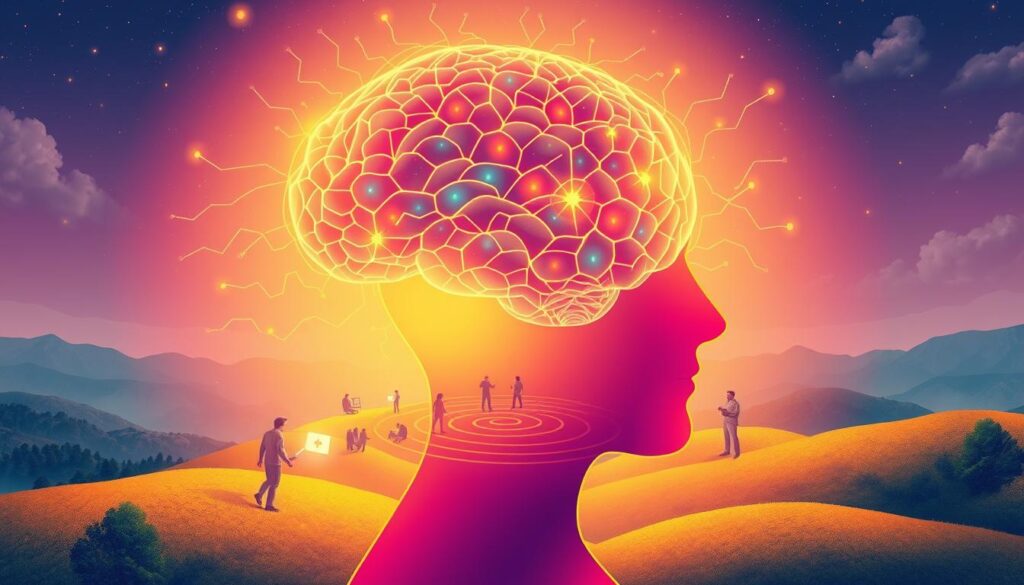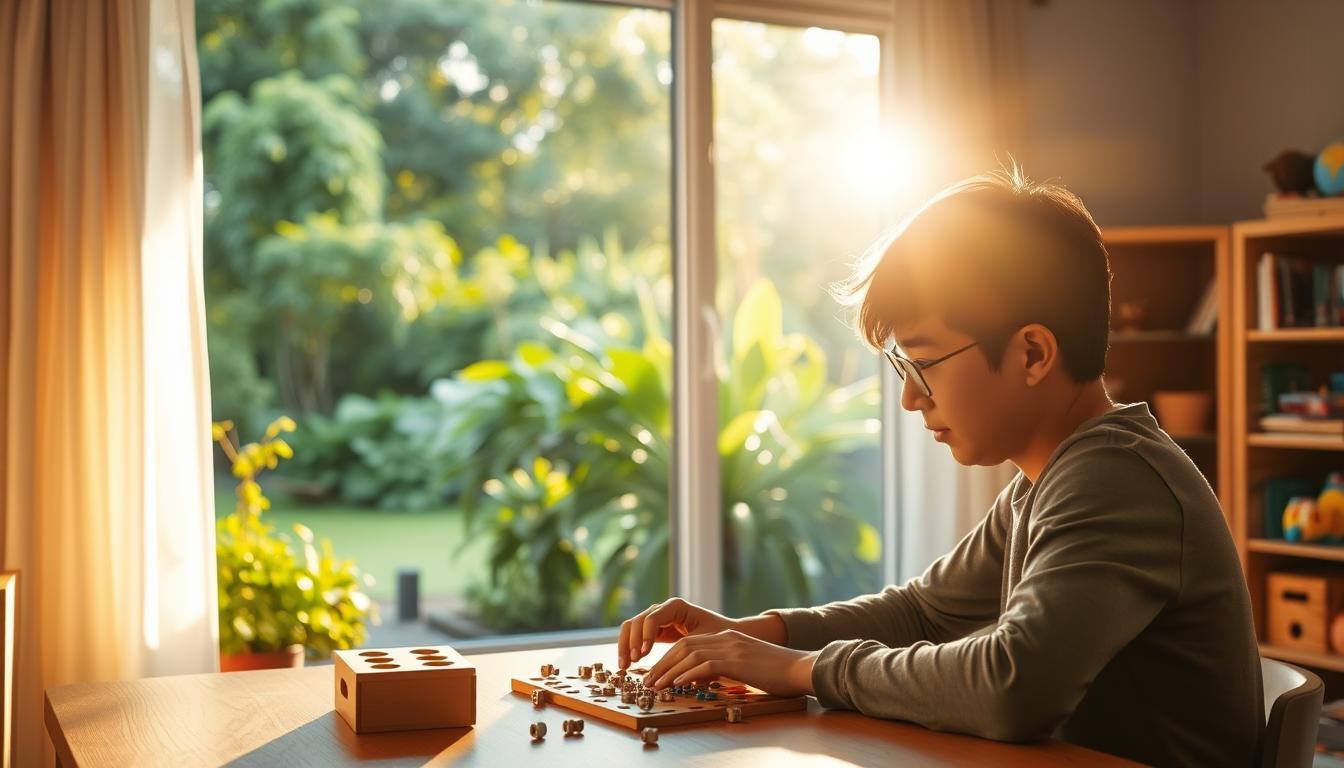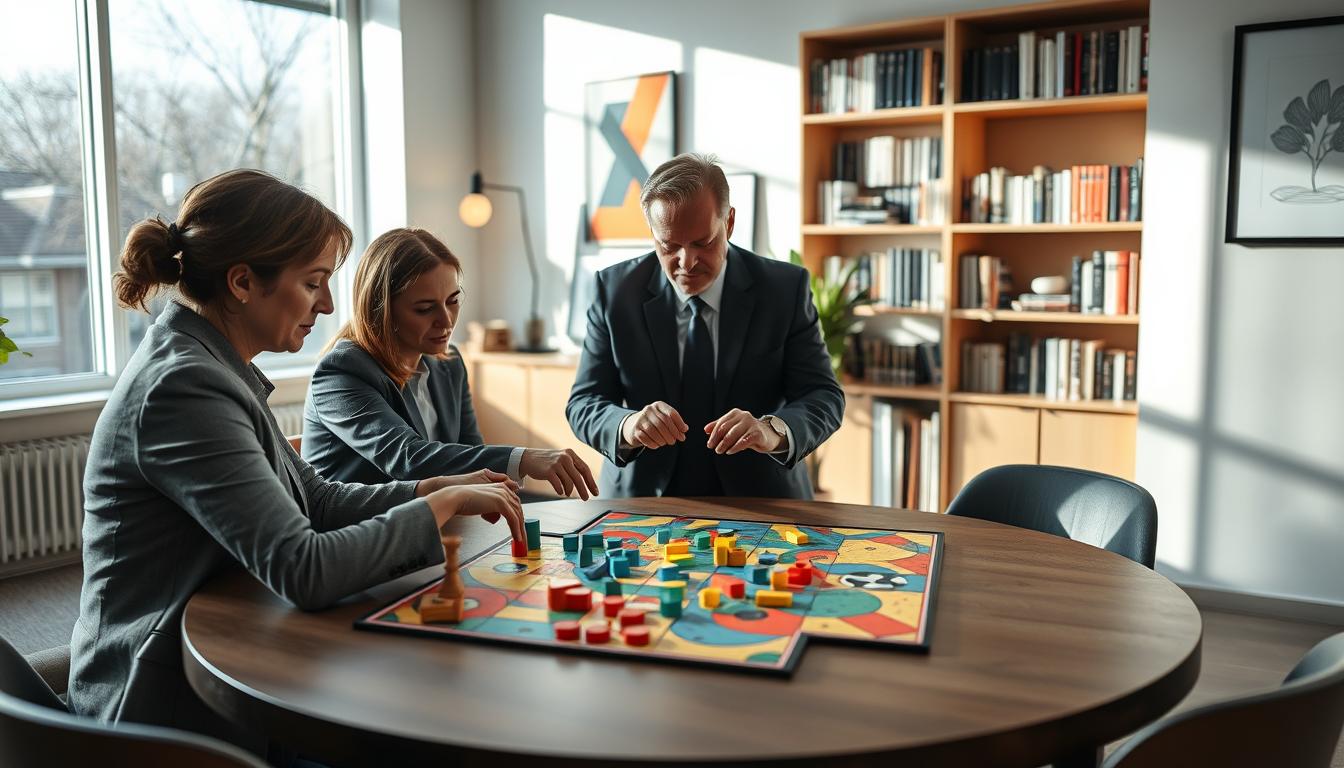Games that strengthen memory related to visual locations and spaces
Have you ever wondered how playing games could enhance your brain’s ability to navigate familiar spaces and retain vital information about your surroundings?
In our daily lives, we need to remember where things are. Brain games that improve visual-spatial memory are very helpful. They make learning fun and help us create mental maps that boost memory.
By playing games that test our visual skills, we get better at everyday tasks. This includes finding our way around and remembering where we last placed things.
Understanding Visual-Spatial Memory
Visual-spatial memory is key in cognitive psychology. It helps us remember and find our way around objects and their spots. It uses two main parts: the visuospatial sketchpad and the central executive system.
The visuospatial sketchpad keeps track of visual and spatial details. It lets us picture scenes and change them in our minds. The central executive, on the other hand, handles tasks like planning and focusing. It makes complex thinking possible.
Knowing this, we can pick brain games that boost visual-spatial memory. Playing games that test these skills can help our brains grow. They make us better at remembering and using visual information in daily life.

Importance of Strengthening Memory
Strengthening memory is key in many areas of life. It helps with school work and everyday tasks. Better memory means you can make smarter choices and solve problems more easily.
Doing activities that improve memory can make you better at reading and planning. This is very helpful for older people who might struggle to remember things. It helps them stay independent and feel more confident in their daily lives.
Adding memory-strengthening habits to your day can make your mind sharper and your mood better. A strong memory lets you enjoy life more. It also helps families get along better by improving communication and understanding.

Types of Memory: Working Memory and Visual-Spatial Skills
It’s key to know the difference between working memory and visual-spatial skills to boost our brain power. Working memory is like a temporary storage for info, helping us with everyday tasks and making decisions. It has three main parts: the phonological loop, the visuospatial sketchpad, and the central executive.
The phonological loop deals with words and sounds. The visuospatial sketchpad handles spatial details. This lets us remember the layout of places. It’s crucial for moving around and doing activities that need visual-spatial skills.
Visual-spatial skills help us process info that involves seeing and space. This skill is important for simple tasks like finding our way to more complex problem-solving. Knowing about these memory types helps us pick the right games and exercises to improve our working memory and visual-spatial skills.
How Games Benefit Cognitive Function
Playing games that challenge your brain can really help your memory grow. Studies show that games not only train your brain but also make your neural connections stronger. This leads to better mental agility, even outside of games.
Interactive games can improve your focus and decision-making skills. These skills are crucial for daily tasks. They show how games can benefit memory and cognitive health for everyone.
Exploring Brain Games for Visual-Spatial Memory
Brain games are fun ways to challenge and improve your thinking. They include puzzles, quizzes, and problem-solving tasks. These activities not only entertain but also help with memory training.
Visual-spatial exercises are key in these games. They help you get better at everyday tasks. This is because they improve your ability to understand and navigate visual information.
What are Brain Games?
Brain games are activities designed to sharpen your mind. They include puzzles, quizzes, and challenges that require focus and thinking. By playing these games regularly, you can boost your mental skills and have fun while doing it.
Why Focus on Visual-Spatial Memory?
Improving visual-spatial memory is important for many life skills. It helps with navigating new places, understanding visual information, and thinking creatively. These skills are crucial for success in school and solving everyday problems.
By doing visual-spatial exercises, you can enhance your cognitive abilities. This ensures you have a well-rounded set of skills.
Popular Games to Enhance Visual Memory
Playing different games can really help improve your visual memory. Games like trivia quizzes, Sudoku, and logic puzzles are great. They make your brain work harder, helping you remember things better.
Trivia Quizzes
Trivia quizzes test your knowledge in many areas, like history and science. They keep your mind sharp and make learning fun. You might learn something new and improve your memory at the same time.
Sudoku and Logic Puzzles
Sudoku puzzles help you think logically. You have to figure out where numbers go in a grid. This improves your pattern recognition skills.
Logic puzzles, like spatial challenges, also boost your brainpower. They help you see things in a new way. These games are great for improving your visual memory.
Interactive Games for All Ages
Interactive games are fun for everyone, no matter their age. They help improve memory and support brain training in a lively way. Families and friends can play together, enjoying games that bring people closer.
Games like charades and puzzles encourage teamwork. They also boost cognitive skills. This makes them great for improving memory and social bonds.
These games are perfect for family gatherings or social events. They help everyone, from kids to seniors, stay mentally sharp. They’re a great way to make learning fun and engaging for all.
Offline Games to Boost Memory
Playing offline games is a fun way to improve your memory. Jigsaw puzzles and card matching games are great for boosting memory. They are enjoyable for people of all ages.
Jigsaw Puzzles
Doing jigsaw puzzles is a fun way to improve your visual memory. You need to figure out how each piece fits into the big picture. It helps you think strategically and stay focused, making your brain stronger.
Card Matching Games
Games like Memory or Concentration involve finding matching cards. These games help improve your working memory and visual skills. They are great for people of all ages, helping to strengthen your memory.
Online Games for Visual-Spatial Memory Training
Many online games help improve visual-spatial memory. They offer puzzles and memory challenges for all skill levels. These games adapt to your progress, making memory training fun and effective.
Brain training apps are a big hit, with visual memory challenges and puzzles. Online Sudoku puzzles improve spatial recognition and logical thinking. Match-the-pairs games make learning fun and engaging.
Simulation games also help with visual-spatial memory. They let you practice and get better at navigating complex environments. These games are great for improving your cognitive skills through fun digital activities.
Engaging with Dual N-Back Training
Dual n-back training is a new way to improve working memory. It involves remembering sequences of visual and auditory stimuli in a grid. Each correct answer gets harder as you go, helping to boost memory.
Studies show it can enhance visual-spatial memory. Regular users see big gains in their brain power. It helps them handle lots of information at once, making learning and adapting easier.
Adding dual n-back training to your routine can change how you process info. It’s a special way to improve memory and focus. It also makes your mind better at solving complex problems in everyday life.
Using Visualization Techniques in Games
Adding visualization techniques to games boosts memory and brain skills. Games that use mental mapping and storytelling make experiences more real. This helps players remember and recall better.
Mental Mapping Activities
Mental mapping in games helps players understand space better. They imagine paths and connections in different game worlds. This makes them better at navigating and remembering game maps.
Players get good at recalling map details. This improves their understanding of the game world. It also boosts their brain function.
Storytelling for Memory Improvement
Storytelling in games helps players remember by linking to stories. Visualizing and feeling the story creates lasting memories. When players connect game details to stories, they remember better.
This mix of story and memory makes games more fun and engaging. It makes the experience richer and more enjoyable.
Engaging with Memory through Arts and Crafts
Arts and crafts activities are great for keeping your mind sharp. They help improve memory by letting you express yourself creatively. Activities like painting and knitting make you think creatively. You need to remember how to do things you’ve done before.
Arts and crafts are also good for your memory. For kids, they help with spatial awareness and planning. For older adults, they improve fine motor skills and thinking, and help them feel connected to others.
Doing arts and crafts is not just fun. It’s also a way to get better at remembering things. It’s a fun way to keep your mind active and sharp.
| Art Activity | Cognitive Benefits | Memory Enhancement |
|---|---|---|
| Painting | Stimulates creativity and planning | Improves visual memory of colors and techniques |
| Knitting | Enhances focus and motor skills | Reinforces memory through pattern recognition |
| Sculpting | Boosts spatial awareness | Encourages recall of shapes and structures |
Multiplayer Games that Foster Social Interaction
Multiplayer games offer a special chance to boost visual-spatial memory while enjoying social time. Players can work together or compete, improving teamwork and communication. This helps build stronger friendships.
Players must remember rules, strategies, and where things are in the game. This keeps their minds active, making it fun and good for their brains. Games like this bring people together, helping everyone learn and grow.
Playing these games can make players better at remembering things and thinking critically. Games like “Fortnite,” “Among Us,” and “Minecraft” show how fun interactions can improve memory and friendships.
Incorporating Mindfulness in Game Play
Playing games with mindfulness can make the experience better and improve your thinking skills. By adding mindfulness games to your routine, you can get sharper focus and better memory. Deep breathing and paying attention to your surroundings help you stay clear-minded.
Mindfulness makes you think more about your gaming, leading to smarter choices and better performance. This way of playing games boosts your brain power. It makes hard tasks easier and more fun.
- Deep breathing techniques to ease tension during gameplay.
- Awareness of in-game environments to enhance spatial memory.
- Reflective practices post-gameplay to assess learning and growth.
Using mindfulness in games has two great benefits. It makes playing games more fun and improves your thinking and memory. By diving deep into the game, you’ll not only play better but also appreciate gaming more.
Conclusion
Playing different games to boost visual-spatial memory is key to better thinking. These games help with remembering places and improve working memory. They also make our mental health better.
Trying out various games, like puzzles and multiplayer games, is great. It lets us pick what we like and need. Games that focus on visual-spatial memory help us think better and stay mentally healthy for life.
Choosing the right games is very important. They mix fun with learning, helping our minds and creativity grow. Dive into the world of games to improve your visual-spatial skills and brain health.
FAQ
What are brain games?
Brain games are puzzles and quizzes that challenge your brain. They help improve memory, creativity, and problem-solving skills. Playing them is a fun way to boost your mental abilities.
Why is visual-spatial memory important?
Visual-spatial memory helps with many important skills. It’s key for navigating, understanding diagrams, and visualizing ideas. Better visual-spatial skills lead to better learning and daily tasks, improving your overall brain function.
How can trivia quizzes enhance memory?
Trivia games make learning fun by testing your memory and knowledge. They keep your mind sharp on a wide range of topics. This includes history, pop culture, and more.
What role do Sudoku and logic puzzles play in memory enhancement?
Sudoku puzzles sharpen your logical thinking and spatial skills. Logic puzzles also boost your critical thinking. Both types of puzzles improve your brain function.
Are there offline games effective for memory improvement?
Yes, games like jigsaw puzzles and Memory or Concentration are great. They improve your visual skills and memory. They’re good for people of all ages.
What online games help enhance visual-spatial memory?
Online, you can find many games that boost visual-spatial memory. There are online Sudoku, visual memory games, and simulation games. These games are designed for different skill levels.
Can dual N-Back training actually improve memory?
Yes, dual N-Back training is a powerful tool. It tests your ability to remember visual and auditory sequences. Regular practice can significantly improve your working memory and brain function.
How do mental mapping activities improve memory?
Mental mapping games enhance your spatial awareness and memory. They help you visualize routes and connections. This makes navigating easier and improves your memory.
What is the impact of storytelling on memory improvement?
Games with stories help you remember details better. They use visualization and emotional connections to strengthen your memory. This makes recalling information easier.
How can arts and crafts enhance cognitive function?
Arts and crafts, like painting and sculpting, boost creativity and brain function. They require planning, spatial awareness, and memory. They benefit both kids and adults.
What are the benefits of multiplayer games for memory?
Multiplayer games improve visual-spatial memory and social skills. They require teamwork and communication. Players remember rules and strategies, making games both fun and educational.
How can mindfulness techniques enrich gameplay?
Mindfulness in games improves focus and reduces stress. It enhances performance in memory games. Techniques like deep breathing and reflection are used.














